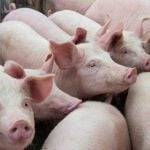Improving feedlot margins contributed to the stronger feeder market. Alberta packers were buying finished cattle on a dressed basis at $500/cwt delivered which was fresh record high. Using a 60 per cent grading, this equates to a live price of $300/cwt. Feedlot breakeven pen closeouts are in the range of $260-$270/cwt. Feedlots are anxious to reload and larger groups of quality packages are limited at this time of year.













